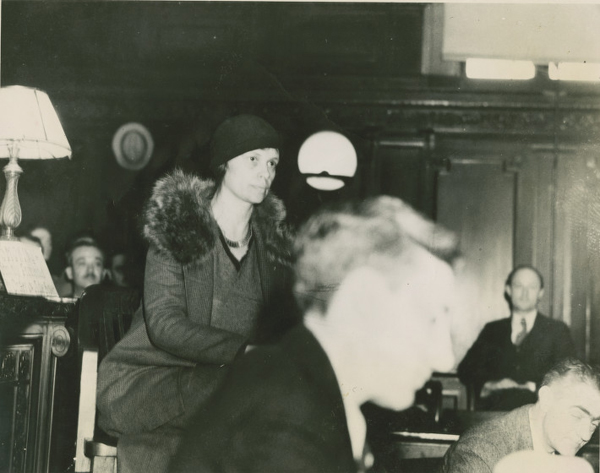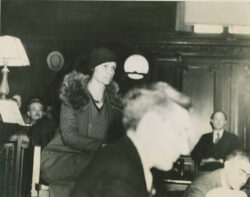Hilda Phelps Hammond
Hilda Phelps Hammond cast herself as Huey P. Long's nemesis and worked energetically but unsuccessfully to have him removed from office.

Courtesy of Louisiana Research Collection at Tulane University Library.
A black and white reproduction of a photograph of Hilda Phelps Hammond on the stand.
Hilda Phelps Hammond, a New Orleans homemaker, cast herself as Huey Long’s nemesis. To focus national attention on his deficiencies, she founded the Women’s Committee of Louisiana and worked energetically but unsuccessfully to have him removed from the US Senate. Though her own political activity was confined to anti-Longism, the organization of women she brought together had a long-lasting impact on Louisiana politics.
Born in 1890 in New Orleans to a newspaper publisher and his wife, Hilda Phelps attended Sophie Newcomb College. There she shone in dramatics, won the Agonistic Prize for best debater, and served as president of the class of 1909. Smart, assertive, and viewed as a leader, Hilda later earned an M.A. in English from Tulane University and led Louisiana’s home front war effort during World War I, chairing the state Woman’s Committee of the Council of National Defense. She married in 1917; her husband, Arthur Hammond, was an attorney with the New Orleans Dock Board.
Huey P. Long suddenly fired Arthur Hammond in 1930 in a naked display of power designed to demonstrate Long’s absolute control over state employees. Arthur Hammond’s influential brother-in-law, Esmond Phelps, was attorney for the Times-Picayune, as well as a key stockholder, when that newspaper vigorously opposed legislation that Long wanted passed. Hammond’s dismissal was payback to the Phelps-Hammond families. Hilda and Arthur Hammond subsequently began a period of serious retrenchment; Hammond never again earned a comfortable living. Stung by the struggle of keeping up appearances on thin resources, Hilda Hammond turned her thoughts to punishing the man who wrecked her domestic tranquility.
In 1933, a US Senate committee met in New Orleans to investigate charges of voter fraud directed at Long’s protégé John Overton, who had just ousted an incumbent senator in a controversial election. The committee heard testimony, much of which reflected poorly on Long. Hammond attended the hearings with a phalanx of society women, eager to see the upstart receive his comeuppance. When the committee returned to Washington, DC, she organized her friends into the Women’s Committee of Louisiana. They mobilized a letter-writing campaign to the senators, acquainting them with the extent of corruption in Louisiana politics. Hammond traveled to Washington six times, meeting individually with senators to persuade them to continue their investigations. Her energies won decidedly favorable publicity in major national publications, and she was invited to speak in many venues across the country. For two and a half years, Hammond insisted relentlessly that Long be held accountable for various excesses and illegalities in state politics.
Hammond summed up her impatience with the timidity of the senate when she stood in the hearings and demanded in disgust, “I ask you, is the United States Senate afraid of Huey Long?” Yet senate inertia born of political calculations overcame Hammond’s crusade against Long’s anti-democratic practices. Long’s assassination in 1935 ended this turbulent chapter of Louisiana history. Hammond lived until 1951. She published an impassioned memoir of her struggles against the Kingfish, Let Freedom Ring, wrote children’s books, occasionally made radio broadcasts but never took public roles again. The women she organized in the Women’s Committee, however, later formed the nucleus of the League of Women Voters, the Independent Women’s Organization, and other political organizations.
